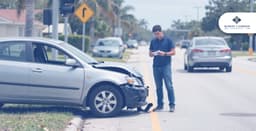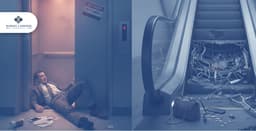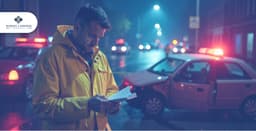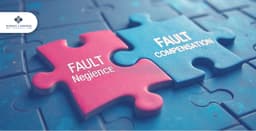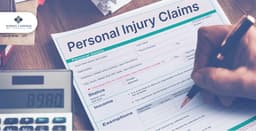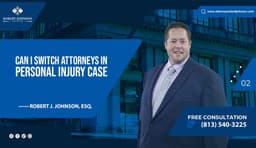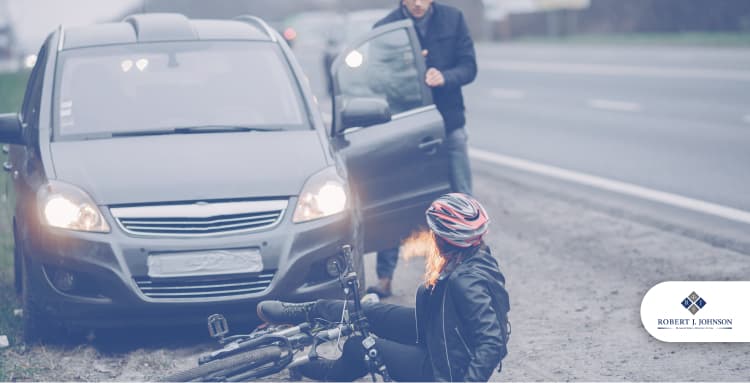
April 30, 2025
The Dangers of DUI Accidents Protecting Your Rights as a Victim
A Driving Under the Influence (DUI) accident can change your life in an instant. When a driver decides to operate a vehicle under the influence of alcohol or drugs, they put others at risk. If a DUI accident has affected you, understanding your legal rights is important.
As a victim, you have the right to seek compensation for your injuries, medical expenses, lost wages, and more. Taking the right steps to protect your rights will help ensure you receive the compensation you deserve. Here’s what you need to know after a DUI accident.
(1) The Scope of DUI Accidents in Florida
Drunk driving continues to be a major threat on Florida’s roads, leading to destructive consequences for victims and their families.
DUI-Related Crashes and Injuries
According to the Florida Department of Highway Safety and Motor Vehicles (FLHSMV), thousands of crashes each year involve drivers under the influence. Florida ranks among the top states for DUI-related fatalities. Survivors often suffer from serious injuries, including brain trauma, spinal cord damage, and internal injuries.
Florida’s Strict DUI Laws and Penalties
A first-time DUI offense can result in fines, license suspension, and imprisonment. Repeat offenses carry harsher penalties, including felony charges. If a DUI results in serious injury, the driver can be charged with DUI with serious bodily injury (a third-degree felony). When the crash leads to a fatality, the driver may face DUI manslaughter, which carries a mandatory prison sentence.
Long-Term Consequences for Victims
Many victims require ongoing medical treatment, surgeries, or rehabilitation. Some suffer permanent disabilities, preventing them from returning to work or daily activities. Emotional trauma, PTSD, and financial burdens can impact victims and their families for years.
(2) Florida Laws Governing DUI Accidents
Florida law is clear—driving under the influence is a serious offense. If you were injured in a DUI accident, here’s what you need to know:
Florida’s DUI Laws and Statute § 316.193: Under Florida Statute § 316.193, driving under the influence of alcohol or drugs can lead to fines, license suspension, and jail time. However, criminal charges do not compensate victims for their losses.
Criminal vs. civil liability: A DUI conviction punishes the driver. However, it does not cover medical bills, lost wages, or pain and suffering. Victims have the right to file a civil lawsuit to seek financial compensation.
Florida’s No-Fault insurance system: Drivers must carry Personal Injury Protection (PIP) insurance. This covers medical expenses and lost income, no matter who caused the accident. However, PIP has limits and does not include pain and suffering.
Filing a lawsuit beyond PIP coverage: Victims can sue the drunk driver if their injuries are serious. Florida law allows this when injuries cause:
✓ Permanent loss of function
✓ Significant scarring or disfigurement
✓ Wrongful death
✓ If a DUI accident causes serious harm, victims can step outside the No-Fault system. This allows them to seek full compensation beyond what insurance provides.
(3) The Legal Rights of DUI Victims
If you’ve been involved in a DUI accident, Florida law provides several options for seeking justice. Here are your rights:
Seeking compensation beyond insurance coverage: Personal Injury Protection (PIP) insurance has limitations. If your injuries are severe, you can pursue compensation beyond insurance for pain, suffering, and other losses by filing a personal injury lawsuit.
Filing a personal injury lawsuit against the at-fault driver: If a drunk driver is responsible for the accident, you have the right to file a lawsuit. This allows you to recover damages that insurance may not cover, such as medical expenses, lost wages, and emotional distress.
Holding bars and establishments liable: Under Florida’s Dram Shop Law (§ 768.125) certain bars or establishments may be held accountable if they serve alcohol to an already intoxicated person who later causes an accident. However, the law has limitations, and proving liability can be challenging.
Wrongful death claims: If you’ve lost a loved one in a DUI accident, you may file a wrongful death claim. This allows surviving family members to seek compensation for funeral expenses, loss of financial support, and the emotional impact of their loss.
(4) Proving Liability in a DUI Accident Case
In a DUI accident case, proving liability is key to securing compensation. Here’s how different types of evidence play a role in establishing negligence under Florida law:
Police reports, breathalyzer results, and witness statements: Police reports provide an official record of the accident, including details like the driver’s impairment and any citations issued. Breathalyzer results are necessary in confirming the driver's level of intoxication at the time of the crash. Witness statements can further strengthen the case by offering independent observations of the driver’s behavior and the accident.
The role of criminal convictions: A criminal conviction for DUI can significantly impact a civil case. While criminal and civil cases are separate, a conviction can serve as strong evidence that the driver was negligent and responsible for the accident. It can also support claims for punitive damages in some cases.
Gathering medical records, expert testimony, and accident reconstruction evidence: To prove the extent of injuries and the impact of the accident, medical records are essential. Expert testimony from medical professionals or accident reconstruction specialists can help establish the severity of the injuries and explain how the accident occurred. Accident reconstruction evidence can clarify how the crash happened and the driver’s role in causing it.
(5) Compensation Available to DUI Victims
If you’ve been injured in a DUI accident, Florida law allows you to seek compensation for a range of damages. Here’s a look at what you might be eligible for:
Medical expenses (past, present, and future): You can recover costs for medical care related to the accident, including emergency room visits, surgeries, physical therapy, and future treatments. These expenses are not limited to what you’ve paid already; they also include costs you will incur as you continue to recover.
Lost wages and loss of earning capacity: When injuries prevent you from working, you can claim lost wages for the time missed from work. If your injuries impact your future ability to work, you may be entitled to compensation for lost earning capacity.
Pain and suffering, emotional distress, and punitive damages: Beyond physical injuries, you can seek compensation for pain and suffering, which covers the physical and emotional toll the accident has taken on you. In cases where the drunk driver acted recklessly, you may also qualify for punitive damages—additional compensation meant to punish the driver for their actions.
Property damage claims and rehabilitation costs: If your vehicle or personal property was damaged in the accident, you can file a property damage claim to cover repair or replacement costs. Additionally, if you require rehabilitation services to recover from your injuries, these expenses can also be included in your claim.
(6) Challenges DUI Victims Face in Legal Claims
Florida law provides avenues for victims to seek compensation. However, several obstacles may arise during the legal process. Here’s a look at some of the common challenges DUI victims face:
Insurance company strategies to minimize payouts
Insurance companies often try to reduce the amount they pay out by downplaying the severity of injuries or shifting blame. They may use strategies such as offering quick and low settlement amounts or questioning the extent of your medical treatment. It’s important to have legal representation to ensure the insurance company does not undervalue your claim.
Delays in criminal proceedings and their impact on civil cases
Criminal cases related to DUI offenses may take time to resolve. These delays can affect the timing of your civil case, as the outcome of the criminal trial can serve as valuable evidence in your lawsuit. However, you don’t have to wait for a criminal conviction to file a civil claim. You can file a civil case while the criminal case is ongoing. However, delays in the criminal process may affect your strategy or case strength.
Comparative negligence defenses
In some DUI accident cases, the defense may try to argue that you, the victim, were partly responsible for the accident. This is known as comparative negligence. If the defense can successfully argue that you share some fault, your compensation may be reduced. Florida follows a pure comparative negligence rule. This means that if you were partially at fault, your damages could be reduced based on the percentage of blame assigned to you.
More Legal Solutions You May Find Helpful:
What Constitutes Wrongful Death in Florida? Legal Insights and Options
What Steps Should be Taken Immediately in Case of a Boat Accident?
Protect Your Rights After a DUI Accident with Robert J. Johnson
After a DUI accident, having an experienced attorney by your side is essential to securing the support and recovery you need. Here’s how Robert J. Johnson can help protect your rights and strengthen your case:
Building a strong case from day one
From the moment you hire us, we begin gathering evidence to build a solid case. This includes reviewing police reports, obtaining medical records, speaking with witnesses, and obtaining any relevant evidence, such as breathalyzer results. We also help identify potential responsible parties beyond the drunk driver, such as bars or establishments that serve alcohol to the intoxicated driver.
Negotiating with insurance companies and maximizing settlements
Insurance companies often try to minimize their payout. We handle negotiations on your behalf to ensure you don’t accept a settlement that is less than what you deserve. We build a strong case with detailed documentation to support your claim.
Preparing for trial if the case cannot be resolved outside of court
If a fair settlement cannot be reached, we are fully prepared to take your case to trial. This involves further investigation, working with expert witnesses, and developing a trial strategy to present the strongest case in court.
Most DUI accident cases settle out of court. However, we're ready to fight for you at trial if needed. So, if you’ve been involved in a DUI accident, don’t wait. Contact us to discuss how we can work together to protect your rights.




